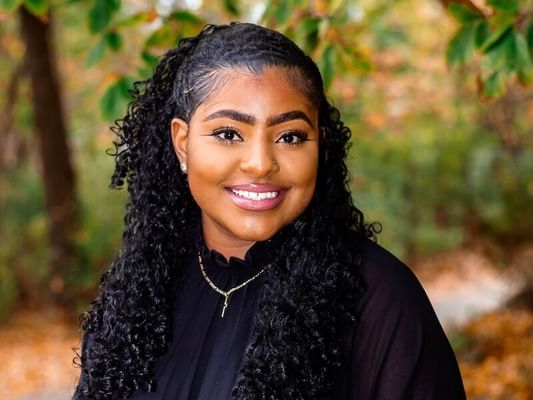- Undergraduate
Bachelor's Degrees
Bachelor of ArtsBachelor of EngineeringDual-Degree ProgramUndergraduate AdmissionsUndergraduate Experience
- Graduate
Graduate Experience
- Research
- Entrepreneurship
- Community
- About
-
Search
All Thayer News

Student Profile: Dartmouth's First Engineering PhD GEM Fellow
Dec 14, 2022 | by Betsy Vereckey
Dartmouth Engineering PhD candidate Adrianne Gowie is studying how to make medical implants safer for the human body. She is the first Dartmouth student to receive an engineering GEM Fellowship, a program aligned with the National GEM Consortium's mission to "enhance the value of the nation's human capital by increasing the participation of underrepresented groups (African Americans, American Indians, and Hispanic Americans) at the master's and doctoral levels in engineering and science."

When Adrianne Gowie was in high school, she thought she might want to be a psychologist. But then, during her senior year, she took a physics class that changed the course of her life. She always loved math, and that pivot led her to an introductory engineering course. She received an assignment to build a small robot, a project that would be a significant portion of her grade.
"The robot was made out of little plastic pieces and had a battery attached to it with a code that was connected to a computer," she recalled. "It wasn't anything fancy, but back then it was mind-blowing." It was a bi-pedal robot that walked like a human being, with one foot in front of the other. She was so engrossed in the project, "it was like seeing a baby start to walk. That was when I decided I was going to major in mechanical engineering. I loved every part of it, and I still do."
A native of Deer Park, NY, Gowie went on to earn her associates degree from SUNY Suffolk County Community College, her bachelor's degree in mechanical engineering technology from SUNY Farmingdale State College, and a graduate degree in mechanical engineering from New York University. She credits her mother—a single parent who raised Gowie while earning a graduate degree—for inspiring her to work hard.
"I saw my mom get her master's degree when I was a child, and I always knew that I had hard work ingrained in me," Gowie said. "My dad fell out of the picture after my parents divorced, and that was hard on me, but I always saw my mom striving for more. She never gave up."
Knowing that she wants to become a professor, Gowie began looking at doctorate programs and liked Dartmouth for its small class sizes. "I just tend to like when the professor knows my name," she said. "It's more personal."
Gowie was selected to work in Professor Ian Baker's lab, which conducts research in materials science and engineering. Working closely with Baker, who is also her advisor, Gowie's research focuses on the use of zinc alloys in biodegradable, biocompatible medical implants that won't be harmful when they break down in the body.
"When I first found out I got into Dartmouth, I cried," she recalled. "Not only was I accepted into one of the most prestigious universities, but I was also confirmed as a GEM Fellow, another title of prestige. It was confirmation of God positioning me."
Gowie's parents were born in Jamaica, and she was the first generation to be born in the US. "I didn't come from the type of economic background that would support attending Dartmouth," she said. "It means everything to me, that someone believes in me and is willing to invest in me with their time, money, and mentorship."
Gowie feels passionate about helping more women enter the engineering field. While earning her master's degree, she served as a mentor for female undergraduates and first-year graduate students. She says she'd love to see more women, especially in mechanical engineering fields, and the importance of representation is one of the main reasons she wants to earn her doctorate.
"I didn't see a lot of women or people of color studying engineering when I was in undergrad or even doing my master's, and I definitely want to be a visual representation of that," she says. "If more women and people of color were in the field, engineering would look more like the real world."
For contacts and other media information visit our Media Resources page.
